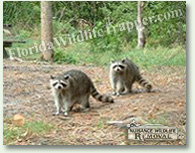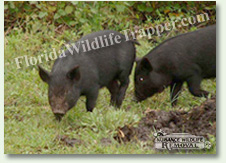
|
Cloud Lake Animal Control
There are many Cloud Lake pest control companies for animals out there, but not all of them are licensed and insured professionals. Make sure that you hire a competent expert for your Cloud Lake exterminator of wildlife. At Nuisance Wildlife Removal, we will be courteous and friendly and take the time to answer your questions. Give our Cloud Lake trappers at Nuisance Wildlife Removal a call, and we will listen to your problem, and make an appointment to perform an inspection.  Florida is full of wildlife, including snakes, squirrels, raccoons, opossums, and more. You will need professional Cloud Lake snake removal or raccoon control if you can't trap the wild animal on your own and perform full repairs and prevention to keep pests out for good. We perform the repairs and decontamination if necessary. Rats and mice love to live in attics, and can chew wires or leave droppings. In fact Cloud Lake wildlife frequently enter homes, and it takes a pest management company to remove them. We are Cloud Lake wildlife management experts, and are familiar with all the pest animals, including all species of Florida snakes and bats. We at Nuisance Wildlife Removal are the best among Cloud Lake nuisance wildlife companies and can solve all animal damage issues. Our wildlife operators are skilled at bird control and bat removal, and would be happy to serve your Cloud Lake bat control or pigeon and bird control needs with a professional solution. Opossums, skunks, moles, and other animals that can damage your lawn - we are the exterminators who can capture and remove them. Our professional pest management of wildlife and animals can solve all of your Cloud Lake animal control and capture needs. Give us a call at 941-729-2103 for a price quote and more information. Cloud Lake News Clips: Nuisance Wildlife and Animal Control in Cloud Lake Colony Collapse Disorder is still the villain in the almond orchards this year ... though whether it's CCD or some other malady is too often hard to decipher. Nevertheless, CCD most always gets the blame. Reports are that more colonies crashed this year than last year (and many had those typical CCD like symptoms), so that means more colonies have crashed this year than ever. Many, far too many went down after they had been placed in their pollination locations in the orchards. There they died, sometimes; or limped along at 10% strength for the duration. A colony with hardly any bees does no pollination since the remaining bees, and the queen, are needed to stay home and take care of the young that remain after a CCD crash. Mostly these dead or dying colonies weren't replaced because there are no extra bees to replace them with. A lot of colonies, thousands and thousands and thousands, crashed after they got to the Golden State, and there's only empty boxes to bring home. Empty boxes earn no money, either. As a result of these crashed colonies, or the many weakened colonies that remain, some beekeepers are reducing the price they are charging for their bees to compensate for the small populations and reduced pollination potential that results. The cost of getting and keeping those colonies to California hasn't gone down though... The Great Bee Hive Heist of 2008 And to add insult to injury, this year the number of colonies being stolen is way, way up too. Pollination colonies sit in the midst of huge, huge orchards, often unseen and unnoticed for days at a time. Some orchards are locked and guarded ... and some aren't. As a result, honey bee thieves can sneak in at night and make off with a truck load of hives ... If you can get 50 strong healthy hives on a medium sized truck and get them to a grower who is desperate for bees in his orchard, you can make yourself some good money. At $150/colony, that truckload of bees amounts to $7,500 for a couple hours work. Not a bad night's haul. To combat this some beekeepers are using remote sensing devices armed with GPS technology carefully hidden and embedded in colonies that are satellite linked to their cell phones (now there's irony for you...) to let them know they have been moved ... and where they have been moved to. But not many have invested in this technology so far ... my bet is that will change. The almond crop seems to be incredible so far ... but it's early ... due to the excellent weather the bees had for pollination. You have to understand that almonds, like many crops that require pollination, don't require much or for long ... but it has to be at exactly the right time. You may only get one good flying day in almonds, and you better have 10 times the bees you'd need on a good year to get all that pollination done in that tiny window of time. So when there is good weather, and there are 'enough' bees, essentially every blossom in the orchard gets attention ... which is exactly what growers want ... every flower needs to produce that single, profitable nut, and they are happy. Most of the trees are now at, or very near petal fall, so the season is wrapping up. Rain at the right time, or timely irrigation will ensure a good crop down the line ... but it all starts with those honey bees. Just as this situation is winding down, another, related crisis is looming for beekeepers. One particular pesticide, used on a wide variety of crops has been banned by the EPA and pretty much every environmental group in the U.S. Furadan, manufactured by FMC has been blamed for killing millions of birds, trillions of bees, and more wildlife than you can imagine. EPA finally banned it and it was set to be removed shortly ... that is until farmers and FMC decided that it shouldn't be. They even have a congressman, Sen. Hatch from Utah (the Bee Hive state ... there's that irony again), supporting them. There's a pitched battle right now on keeping, or not keeping this poison available ... and killing more birds, more bees, and more of everything it touches. It's always something. CCD? Well, no, this isn't CCD. But dead bees tell no tales, no matter what killed them. Now that the bloom is winding down, better analyses of what caused all those crashes is beginning even as you read this ... and the early reports are scary. Virus certainly is playing more of a role than most thought it would, and varroa mite ... that wicked, evil bug ... is still at the heart of it all, it seems. Control varroa in a colony and all the rest of these demons seem to fall into place. But the looking still goes on and time, research, money and probably luck will tell the rest of the story. Stay tuned.
| |||||||||||||||||||||||||||||
 Service Area Overview - Click here for more areas
Service Area Overview - Click here for more areas
Manatee, Sarasota, Charlotte,Orange, Hillsborough, Citrus, Hernando, Pasco, Pinellas, Polk, Lee, Palm Beach, Orlando, St. Lucie, Martin, Bradenton, Clearwater, Lakeland, Largo, Port Charlotte, St. Petersburg, Sarasota, Tampa, Tarpon Springs, Venice, West Palm Beach | |||
 Copyright 2011-2017 © Nuisance Wildlife Relocation, Inc. All Rights Reserved. FloridaWildlifeTrapper.com |
|||

 Nuisance Wildlife Removal provides professional wildlife control for both residential & commercial customers in the city of Cloud Lake Florida. We offer custom animal control solutions for almost any type of wildlife problem, whether it be the noises of squirrels running through the attic, a colony of bats living in a building, or the destructive behavior of a raccoon or other critter, we have the experience and the tools to quickly and professionally solve your problem. For a consultation, give us a call at 941-729-2103
Nuisance Wildlife Removal provides professional wildlife control for both residential & commercial customers in the city of Cloud Lake Florida. We offer custom animal control solutions for almost any type of wildlife problem, whether it be the noises of squirrels running through the attic, a colony of bats living in a building, or the destructive behavior of a raccoon or other critter, we have the experience and the tools to quickly and professionally solve your problem. For a consultation, give us a call at 941-729-2103